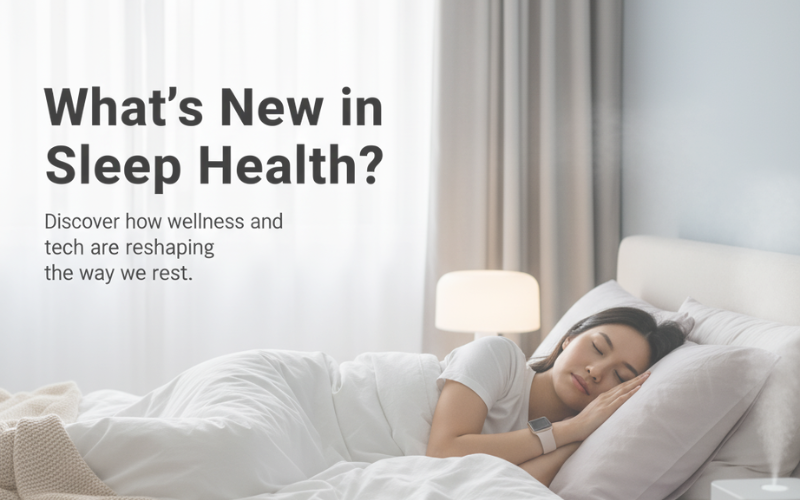Quick Summary:
- Using screens close to bedtime can negatively affect sleep quality, delay melatonin production, and increase insomnia risk.
- Blue light and mentally stimulating content are the biggest culprits, keeping your brain wired when it should be winding down.
- Good news: reducing screen time before bed doesn’t mean going tech-free. Even small, consistent tweaks can improve your rest.
- This article shares 7 simple, science-backed tips to reduce screen use before sleep, without turning your life upside down.
- If you’re struggling with falling asleep, staying asleep, or waking up groggy, your nightly screen habits may be the missing link.
How Screens Disrupt Your Natural Sleep Rhythms
A. Blue Light Delays Melatonin
Screens emit short-wavelength blue light, which can interfere with melatonin, a hormone your body produces naturally to help you fall asleep. Blue light tricks your brain into thinking it’s still daytime, delaying your internal sleep clock.
B. Your Brain Stays on High Alert
Beyond the light exposure, screens are mentally and emotionally stimulating. Whether you’re answering work emails or watching a true crime docuseries, you’re keeping your brain in “go mode” when it should be slowing down. This makes it harder to unwind, fall asleep, and stay asleep.
Top 7 Tips to Reduce Screen Time Before Bed
Here are seven beginner-friendly, expert-backed tips to help you gently reduce your screen time before bed and support more restful sleep.
Tip 1: Set a Digital Curfew
Start with a simple rule: no screens at least 30–60 minutes before bedtime.
Think of it like a wind-down window for your brain. Just as you brush your teeth every night, this can become a regular part of your routine.
Try this:
- Set a phone alarm or app reminder to unplug
- Power down devices at a consistent time nightly
- Keep devices in another room to reduce temptation
According to a study, more screen time, especially on computers, was linked to later bedtimes and less total sleep in kids and teens. Computer use had a stronger negative impact than TV, likely because it’s more interactive.
Tip 2: Make Screen Time Less Stimulating
Some nights, unplugging entirely might not be realistic. That’s okay. You can still reduce the impact by making your screen use less activating.
Here’s how:
- Switch on night mode or blue light filters on all devices
- Avoid emotionally charged or interactive content (like social media)
- Opt for calming videos, ambient music, or guided sleep meditations
Even these small adjustments help soften the cognitive load and light exposure before bed.
Tip 3: Create a Calming Pre-Bed Routine
Replacing screen time with soothing rituals signals your body that it’s time to rest. This helps train your brain to associate bedtime with relaxation, not stimulation.
Wind-down ideas:
- Take a warm shower or bath
- Read a print book or magazine
- Do gentle stretches or yoga
- Try deep breathing or a short meditation
- Sip a non-caffeinated tea like chamomile
Bonus: If you’re looking for extra help winding down, consider adding products from Calm by Wellness as part of your routine:
- Sleep Well Gummies with melatonin (2 mg per serving) plus Vitamin B6 and passion‑flower extract are designed to help with sleep onset.
- Sleep Oil Tincture, a blend of CBD and CBN crafted to help ease the mind and support more restful sleep, is also an option.
- If you prefer topical supports, CBD topicals (e.g., lotions or magnesium‑infused lotions for stress & sleep) can be layered into your bedtime ritual, perhaps after your bath, you apply a soothing lotion while dimming lights and setting aside screens.
Important note: These are tools, not cures. While research on CBD, CBN, and melatonin suggests potential benefits for sleep (especially when paired with good sleep hygiene), they don’t replace healthy habits. If you’re pregnant, on medication, or have a chronic condition, check with your doctor before adding supplements or CBD‑based products.
You don’t need a long routine, just something consistent and comforting. Combining the ritual plus the tool can make your transition to sleep smoother.
Tip 4: Design a Sleep-Friendly Environment
The space you sleep in can either support or sabotage your sleep.
Try these sleep hygiene upgrades:
- Keep the bedroom cool, dark, and quiet
- Use blackout curtains or a sleep mask
- Remove or silence notifications on devices
- Charge your phone outside the bedroom
Studies show that removing digital distractions from the sleep environment is associated with improved sleep efficiency.
Tip 5: Stick to a Regular Sleep Schedule
Your brain loves rhythm. Going to bed and waking up at the same time every day helps strengthen your circadian cycle and makes you less vulnerable to the effects of late-night screen use.
Helpful tips:
- Choose a consistent bedtime, even on weekends
- Wake up at the same time daily
- Avoid naps longer than 30 minutes during the day
A stable schedule trains your body to fall asleep more easily, even when life gets chaotic.
Tip 6: Swap Screens for Relaxing Activities
Instead of doom-scrolling, try replacing screens with something genuinely calming. This not only reduces exposure but also gives your mind space to slow down.
Soothing swaps:
- Listen to an audiobook or a calming podcast
- Write in a gratitude or reflection journal
- Practice a few minutes of mindfulness
- Try drawing, knitting, or other quiet hobbies
Replacing, not just removing, screen time makes the habit change easier and more enjoyable.
Tip 7: Be Realistic and Kind to Yourself
Let’s be honest: life is busy, and sometimes screens are a source of connection or comfort. You don’t need to be perfect. Start where you are.
Remember:
- Progress over perfection
- Start with one tip at a time
- Celebrate small wins (like one screen-free night!)
- If your sleep doesn’t improve, consider consulting a sleep professional
This is about building better habits over time, not achieving digital purity.
Conclusion
Reducing screen time before bed isn’t about going off the grid; it’s about giving your brain and body a chance to relax and do what they’re wired to do: rest and recover.
With simple shifts like setting a digital curfew, creating a calm evening routine, and making your sleep space screen-free, you’ll likely notice:
- Falling asleep faster
- Waking up less during the night
- Feeling more refreshed in the morning
The key is consistency, not perfection.
Even small changes to your nighttime tech habits can lead to better sleep, more energy, and improved overall well-being. Try just one tip tonight and see how you feel tomorrow.



